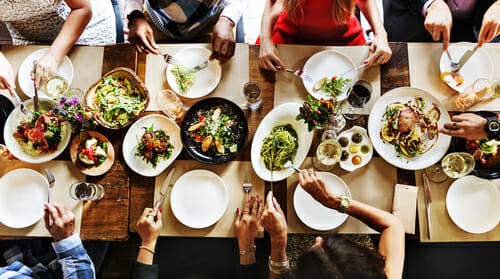A friend of mine told me a story about his grandmother, a tough as nails farmer who held onto the farm for years after her loved ones had passed. As a teenager, he’d visit her house for the summer, and he remembered the piles of food she cooked for every meal.
Her years of running a farm – and her years of feeding both family and farm hands at meal time – meant that she cooked for 12, not 2. So the breakfast table groaned with homemade muffins, corn bread, bacon, grits, eggs, greens, and sausages.
He said that there was so much that scared her at that time – the farm work was never done, there were too few people to help, and she was constantly facing the threat of too little money to hold onto the land.
But the kitchen was her Queendom where she could reign. She was well known as a wonderful, gifted cook and the kitchen was one place where the alarming truths of life could rest for a while.
Her fears and the endless farm chores waited outside the kitchen. And she might not be able to control the weather, or what grew that season. But for a moment, she was sheltered: she had a place where she could have some respite from what scared her and turn out a perfect pie.
What’s the need for control about?
I’ve been thinking about that story a lot this week. It’s commonly understood that many eating disorders or food addictions are about feeling a sense of control where there isn’t control.
There can be some truth to this. But this idea can be expressed with a bit of analysis, as in, “well that’s what it is.” Or sometimes you can sense of feeling of, “you can’t be in control, so you should cut it out.”
I would shift this language to point more clearly to what we’re needing. In other words, what’s under this need for control?
- We might need a space where we feel empowered and hopeful, where we feel like we can make an impact, feel a positive sense of possibility and agency.
- We might need a space where can be sheltered from things that are frightening. If we’re facing financial stress, illness, or fractured relationships, our nervous systems can be filled with alarm, anxiety and worry. It’s a relief to have a space where we can move the fear through our bodies – where we can rest and feel a sense of safety, support and holding.
Or we might need a domain where we can move the energy of frustration – where we can effect change and make something work.
Often, these feelings are what’s driving us to seek relief in food or other addictive patterns.
Treating ourselves with dignity
I think it’s so important to bring dignity and respect to our needs for safety and for the ways these emotions stir us up.
With this respect, we can relate to ourselves with more compassion and with more wisdom. We accept that we get alarmed and stirred up sometimes. We accept that all feelings come to meet us.
We may need to give ourselves some helpful ways to move our alarm so that it doesn’t come out in food. We may need to give ourselves a playful area where we can feel a sense of control, empowerment, efficacy, or safety.
In my own life, I, too, will cook my family a healthy dinner when I’m overwhelmed by fear or alarm. There’s something very grounding about chopping vegetables, stirring the pot, and cutting herbs from the garden to season the meal.
Feeling like I can do ‘something’ – and do something useful – helps me cope with the stresses and worries – especially if I’m alarmed by something that has me feeling powerless.
After cooking, I feel stronger and more capable of facing whatever’s alarming me.
Softening the weight of control
In her book, Hold Me Tight, therapist and trainer Dr. Sue Johnson says that “loving relationships are the only safety that nature gives us.” Some wise teachers have pointed out that the ultimate safety we want – to be protected from all harm – is an illusion, which is true: so much of life is out of our control.
But having a little place – a small queen or kingdom – where we can feel a sense of power and agency can help us cope with all that’s outside of our control.
If being in control of your body or your food is where you feel a sense of power or agency, and if this has become rigid or painful, you might reflect on how you can soften this a bit.
You can also wonder about how you can carve out another area of your life where you have a sense of agency that doesn’t harm yourself – I think of my husband’s 12 year journey of getting his black belt in ju jitsu, or a friend who makes gorgeous miniature doll houses where she arranges them just as she wants them, or the beautifully cultivated garden of my neighbor.
When we have playful areas where we can feel a sense of power and the capacity to effect change, the intensity, focus, and energy is lifted off of food and our precious bodies, where they can breathe a bit, carry less psychological weight, be cared for with love, and thrive.
